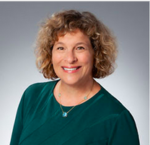By Heidi Gantwerk
Jewish Federation of San Diego

SAN DIEGO — Tomorrow night, like millions of Jews around the world, I will sit at a seder table with family and friends to retell the story of Passover and our liberation from bondage. I will make my mother’s brisket, use the same charoset recipe my family has enjoyed for generations, and read from our “Gantwerk Family Haggadah,” created by my parents when I was a child.
I have been reflecting on the enduring relevance of the Passover holiday, and why the story of the Exodus always seems to meet the current moment. I wish that was not true; that instead the story of Passover felt purely historical. But this year especially, it feels more relevant than ever.
Israel is still at war. Hostages remain in Gaza. Antisemitism is occurring at an alarming rate. And too many people in the U.S. and around the world are experiencing their own painful constriction – their own midbar or desert. That resonance is precisely why, in every generation and under every condition, Jews have found ways to gather for Passover and retell the story.
Across centuries, the Exodus has served, according to Rabbi Lord Jonathan Sachs, as “not just the founding myth of the Jewish people. It is the meta-narrative of hope.”
As I prepare to travel next week to Poland for Federation’s March of the Living mission – commemorating the 80th anniversary of the liberation of Auschwitz – I have been reading Passover memories of Holocaust Survivors.
In A Daughter of Many Mothers, Rena Quint recalls:
“My town of Piotrków, Poland, became the first Nazi ghetto. By Passover 1940, we had been under German occupation for six months… Many homeowners made their own Passover wine from raisins… Even under occupation, the Piotrków bakers cleaned their ovens, covered the surfaces and began making matzah. It didn’t occur to the Jews of Piotrków that the holiday wouldn’t be celebrated. Just the opposite. In the physical and psychological suffering of the ghetto, the week when we celebrated our deliverance from Egypt as slaves, there was still a symbol of hope.”
At the Vaihingen concentration camp in Germany, prisoners were asked to make paste to glue photos to targets for shooting practice. They pocketed the extra flour and secretly made matzah, hiding it under shingles in the workrooms until, on the night of Passover, 20 Jews gathered to celebrate – risking their lives to do so.
And in the newly published Haggadah of Freedom from the Hostages and Missing Families Forum, former hostage Liri Albag shares:
“There was one moment of hope in the perpetual darkness we were held in, and that took place on Passover as Agam Berger and I prepared to mark the Seder. A few days before the holiday, I took a pen and improvised a Haggadah. I wrote down verses from a Siddur we had, drew some pictures and added Passover songs. We sat down for the ‘Seder’ and read from our Haggadah… Despite our difficulties, it was important for us to observe the holiday and maintain the belief that our freedom would come soon. We prayed that the holiday would bring with it the news that we so yearned for. Although we were not released then, that moment gave us the strength to carry on.”
In conditions as horrific as anything the Israelites endured, Jews have gathered to retell the Passover story – and have found hope. Simply holding a seder in a concentration camp is an astonishing act of resistance.
The Passover story compels us to advocate for our own freedom, and for freedom and justice for all.
In 1964, Rabbi Joachim Prinz, then President of the American Jewish Committee, wrote words that still resonate today:
“The ancient festival of Passover marks the first struggle in recorded history for national independence and religious liberty. Yet we need not confine ourselves to the past to seek examples of the yearning for human dignity and human freedom felt by (people) of all races and religions… As we celebrate this festival, let us commit ourselves to the unfinished business of freedom – this precious gift that must ever be achieved, ever preserved, ever extended.”
This Passover, may the story of our liberation inspire us to spark hope – in our own lives, and in the lives of others.
Wishing you and your loved ones a sweet Pesach.
*
Heidi Gantwerk is president and CEO of the Jewish Federation of San Diego.